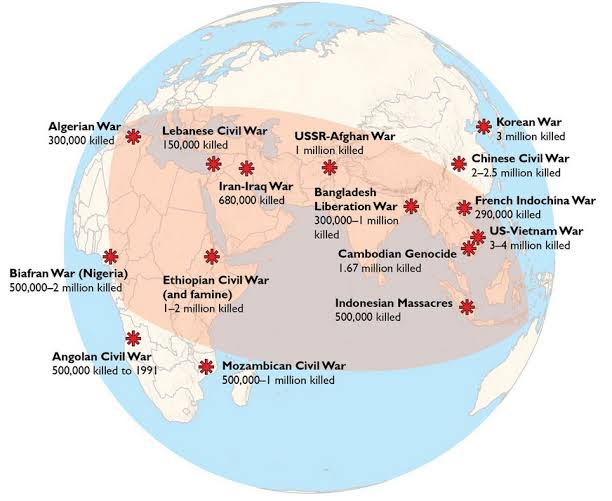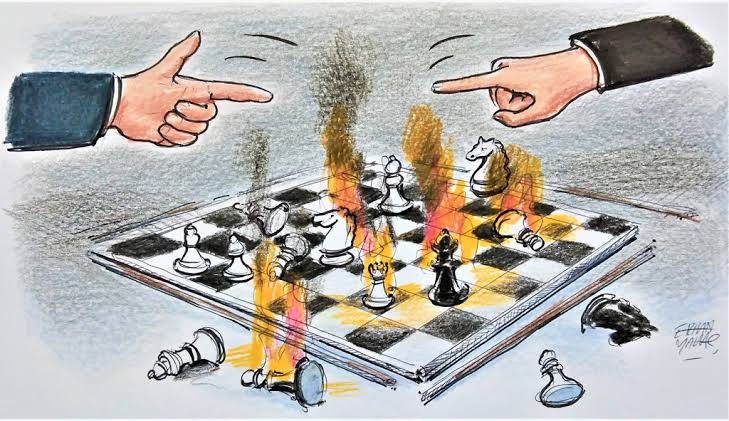Understanding Proxy wars in International Relations using Realism and Game Theory
Introduction to Proxy Wars
Proxy wars, in the realm of international relations, are conflicts where major powers support opposing parties in a third country’s war, often to further their own interests without directly engaging in the conflict. This strategic chess game has been a key part of global politics since at least the Cold War, when the U.S. and Soviet Union backed different sides in regional conflicts. Today, their significance continues, as seen in places like Syria and Yemen, where major powers exert influence through local actors, shaping the geopolitical landscape without direct confrontation.

Realism and Proxy Wars
Realism, a dominant theory in international relations, offers a compelling explanation for the occurrence of proxy wars. It views states as rational actors seeking power and security in an anarchic international system. In this context, proxy wars become a means for states to assert their power and protect their interests without the risks of direct warfare. This pursuit of national interests, often under the guise of supporting allied regimes or ideologies, aligns with the Realist view that global politics is fundamentally about power and survival. In proxy wars, states project their influence and address security concerns through less direct, yet impactful, means.
In the context of proxy wars, Realism’s perspective aligns closely with the principles of game theory, which examines strategic interactions where the outcome for each participant depends on the actions of others. Proxy wars can be seen as a strategic game, where states calculate moves and countermoves, considering the potential responses of other international actors. This strategic thinking is crucial in proxy wars, where direct confrontation is avoided but indirect actions can significantly influence the balance of power.
By supporting allies or proxies in strategic locations, states aim to gain advantages or counter the influence of adversaries, much like players maneuvering on a chessboard.
This approach highlights the Realist assertion that international relations are a continuous struggle for power and security in an unpredictable global arena.

Case Studies
- Historical Proxy Wars During the Cold War: The Cold War era is filled with examples of proxy wars. The Vietnam War, for instance, saw the U.S. supporting South Vietnam as a means to counter the spread of communism led by the Soviet-backed North Vietnam. Similarly, the Soviet-Afghan War was a critical proxy battleground, with the U.S. supporting Afghan mujahideen to counter Soviet influence.
- Recent Examples: Syria and Yemen: In more recent times, the conflicts in Syria and Yemen show us the ongoing relevance of proxy wars. In Syria, various global and regional powers, including Russia, the U.S., and Iran, have backed different factions, making the conflict a complex game of competing interests and strategic positioning. Yemen’s war has seen a similar pattern, with Saudi Arabia and Iran supporting opposing sides. These conflicts illustrate the continuing Realist dynamics in international relations, where state power and security considerations drive involvement in distant conflicts, often under the banner of ideological or humanitarian concerns.
Impacts of Proxy Wars
Proxy wars significantly impact both the involved states and the international community- spanning political, social, and economic realms. Politically, they worsen tensions between major powers and can lead to long-term destabilization in the regions where they occur. Socially, proxy wars inflict devastating human costs – loss of life, displacement of populations, and deep societal traumas that can persist for generations like we’ve seen in Israel and Gaza. Economically, these conflicts drain resources, disrupt markets, and can hinder development in affected areas.
They strain international relations and can divert global resources away from other pressing issues. Proxy wars create intricate webs of alliances and enmities, contributing to an unstable international environment.
Resolving Proxy Wars
From a Realist perspective, resolving proxy wars often involves strategies that emphasize power balance and diplomacy. One approach could be for major powers to engage in negotiations, recognizing their mutual interests in avoiding direct conflict and the unsustainable costs of prolonged proxy wars. These negotiations might involve power-balancing agreements, where states agree to limit their involvement in third-party conflicts in exchange for similar concessions from their adversaries. Diplomacy plays a crucial role in these strategies, providing a platform for dialogue and the potential for peaceful resolution.
Realists might also advocate for the strengthening of international norms against indirect aggression and the use of proxies, though enforcement remains a challenge in the anarchic international system.
Ultimately, Realist strategies for resolving proxy wars focus on pragmatic considerations of power and security, seeking stability through balance rather than idealistic pursuits of global harmony.
Proxy War Conclusions
- Proxy wars are conflicts where major powers use third parties to exert influence and pursue their interests without direct confrontation.
- They are critical in understanding global power dynamics- Proxy Wars reflect the underlying interests and strategic maneuvers of major states.
- Internationalists will be eager to apply Realist principles and game theory, as they involve strategic calculations by states seeking power and security in an anarchic international system.
- Proxy wars have an huge impact on global stability, often escalating regional conflicts and complicating international relations.
- Resolving proxy wars presents a complex challenge for international diplomacy, demanding a nuanced understanding of the balance of power and strategic interests.
Sources
- The Concise Oxford Dictionary of Politics and International Relations. (2018). En Oxford University Press eBooks. https://doi.org/10.1093/acref/9780199670840.001.0001
- Game Theory (Stanford Encyclopedia of Philosophy). (2023, 3 septiembre). https://plato.stanford.edu/entries/game-theory/
- Mason, S. (2021, 2 septiembre). The return of Great-Power Proxy Wars – War on the Rocks. War on the Rocks. https://warontherocks.com/2021/09/the-return-of-great-power-proxy-wars/
- ChatGPT. (n.d.). OpenAI. https://chat.openai.com/#









No responses yet